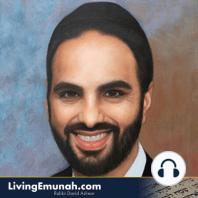20 min listen

Parashat Emor: Spending with Emunah
Parashat Emor: Spending with Emunah
ratings:
Length:
20 minutes
Released:
May 5, 2023
Format:
Podcast episode
Description
One of the pesukim in this week’s parasha, Emor, gives us the commandment to give certain gifts to the poor from our land. Rashi brings from Chazal that the Torah gives this commandment right in the middle of discussing all the holidays to teach us, whoever gives these gifts to the poor will be considered as if he built the Beit HaMikdash and brought korbanot in it. Throughout the generation for nearly 2000 years, all of the tzaddikei hador have been yearning for the Beit HaMikdash, and here, when a Jew gives portions of his crops to the poor, Hashem considers it like he built it and served Him in it. This is how valuable helping the poor is. In general, the rule is the harder something is to do, the more value it has. And so, giving charity the right way must not be that easy and could always use chizuk. The Gemara says towards the end of Masechet Sotah that after the Beit HaMikdash was destroyed, פסקו אנשי אמנה - the Jewish People lost what it means to be a person with emunah. Rashi writes, this refers to people who have no worry whatsoever that they are losing when they do good deeds. Rashi later explains further that these are people who are willing to spend their money on whatever it takes to do mitzvot the most beautiful way or to give tzedaka or to spend on Shabbat and Yom Tov, relying on the fact that they have Hashem to take care of them, and He has unlimited funds. There is something unique about these three things that Rashi mentions. The Gemana in Masechet Baba Kama says, a major portion of the money that we spend on beautifying the mitzvot does not come out of the money that Hashem allotted for us, but rather He pays for it. The Gemara in Masechet Shabbat says the money we spend on Shabbat and Yom Tov as well does not come out of our accounts. Anything we spend on them, Hashem reimburses us for. The Gemara says giving tzedaka is a segula to preserve one’s money and always have what one needs. We still have people today with emunah, but what the Gemara means is that we lost the people with complete emunah, that is, people who can go to the grocery store and shop for Shabbat and feel like they have the company credit card and the boss happily told them to charge whatever they want to his account. And the same when beautifying mitzvot and giving tzedaka, not feeling at all that they are actually spending or giving up anything for them. The more a person develops this emunah, the easier time he will have parting with his money to do the will of Hashem. The Mashgiach of the Kaminetz Yeshiva Rav Moshe Aharon Stern, zatzal , used to rebuke the young rabbinical students in his yeshiva who had very little income. They used to go to their parents house’s on Shabbat for the meals so they could save their money to buy food during the week. He used to tell them, this is what the Gemara means when it says פסקו אנשי אמנה . It used to be that people would buy their food all week long for Shabbat in order to include it in the free gift from Hashem, then they would eat from the leftovers all week long for their weekday meals. Cooking in abundance for Shabbat is also kavod Shabbat, and therefore is also included in Hashem’s guarantee. The Imrei Emet said this was the intention of Shamai who used to buy food lichvod Shabbat all week long, starting from Sunday. Since all the purchases were made for Shabbat, they were made on Hashem’s account. And the Rabbi concluded regarding his student, now the opposite is being done, they were saving their money to buy food for the week and not spending anything for Shabbat. Parting with money is not easy, especially when a person works hard to earn it. This is why giving tzedaka and spending on mitzvot is so valuable. We must always take to heart, the money is Hashem’s and when we do with it what He wants He provides more. Our goal is not just to give tzedaka, or just to spend money on Shabbat and hidur mitzvah, it’s to do it with joy, to feel that its Hashem’s money that He gave us to spend on th
Released:
May 5, 2023
Format:
Podcast episode
Titles in the series (25)
Parashat Emor: Spending with Emunah: Living Emunah Podcast by Living Emunah By Rabbi David Ashear